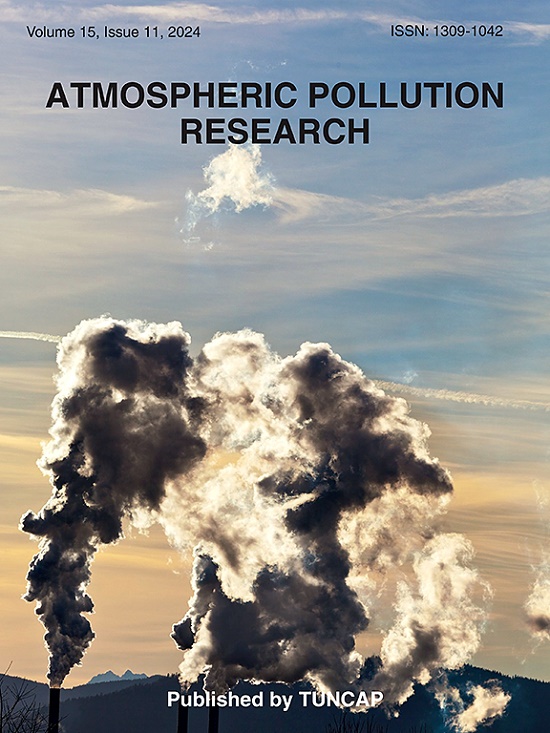俄乌战争对黑海地区空气污染的影响,由于海上运输的变化
IF 3.5
3区 环境科学与生态学
Q2 ENVIRONMENTAL SCIENCES
引用次数: 0
摘要
2022年2月24日开始的俄乌战争影响了黑海的海上运输,除了其他社会和环境影响外,还导致空气污染水平发生重大变化。本研究通过分析troomi NO2和SO2以及COBRA算法从2019年(战前)和2022年(战争)以及2019 - 2022年这两年的SO2检索,研究了海上活动减少对黑海空气污染水平的影响。为了确定时空变化,检索结果与EMODnet路线密度(RD)数据进行了时空匹配。对研究区域、主要航线和港口的污染水平进行了检查。结果表明,乌克兰港口(敖德萨、赫尔松和尤日尼)周围的海上交通急剧下降,而黑海东部的海上交通则有所增加,特别是在俄罗斯港口(新罗西斯克和图普apse)附近。这种航运模式的转变影响了二氧化氮浓度,在海洋活动加剧的东部地区显著增加,而在西北地区则减少。相比之下,由于额外的影响和不确定性,SO2水平表现出更复杂的响应。这些结果突出了在没有地面监测的情况下,基于卫星的测量在评估近海海洋区域空气质量影响方面的重要性。该研究显示了俄乌战争对区域空气污染的复杂影响,表明虽然海上交通减少导致某些地区污染物浓度降低,但替代航线、军事活动和其他因素导致其他地区污染加剧。本文章由计算机程序翻译,如有差异,请以英文原文为准。
Impacts of Russia-Ukraine War on air pollution over the Black Sea Region due to changes in maritime transport
The Russia-Ukraine war, which began on February 24, 2022, has affected maritime transport in the Black Sea, leading to significant changes in air pollution levels in addition to other social and environmental impacts. This study examines the impact of reduced maritime activity on air pollution levels in the Black Sea by analyzing TROPOMI NO2 and SO2 as well as COBRA algorithm SO2 retrievals from two years: 2019 (pre-war) and 2022 (war) along with 2019–2022 interval. To determine spatio-temporal variations, retrievals were spatially and temporally matched with EMODnet route density (RD) data. The pollution levels in the study region, over major shipping routes, and ports were examined.
The results indicated that maritime traffic declined sharply around Ukrainian ports (Odessa, Kherson, and Yuzhny), while it increased in the eastern Black Sea, particularly near Russian ports (Novorossiysk and Tuapse). This shift in shipping patterns influenced NO2 concentrations, with significant increases in the eastern regions where maritime activity intensified and decreases in the northwestern regions. In contrast, SO2 levels showed a more complex response due to additional influences and uncertainties on SO2 retrievals. These results highlighted the importance of satellite-based measurements in evaluating air quality impacts at offshore maritime regions with no ground-based monitoring. The study showed the complex effects of the Russia-Ukraine war on regional air pollution, demonstrating that while reduced maritime traffic led to lower pollutant concentrations in some areas, alternative shipping routes, military activities, and other factors contributed to increased pollution in others.
求助全文
通过发布文献求助,成功后即可免费获取论文全文。
去求助
来源期刊

Atmospheric Pollution Research
ENVIRONMENTAL SCIENCES-
CiteScore
8.30
自引率
6.70%
发文量
256
审稿时长
36 days
期刊介绍:
Atmospheric Pollution Research (APR) is an international journal designed for the publication of articles on air pollution. Papers should present novel experimental results, theory and modeling of air pollution on local, regional, or global scales. Areas covered are research on inorganic, organic, and persistent organic air pollutants, air quality monitoring, air quality management, atmospheric dispersion and transport, air-surface (soil, water, and vegetation) exchange of pollutants, dry and wet deposition, indoor air quality, exposure assessment, health effects, satellite measurements, natural emissions, atmospheric chemistry, greenhouse gases, and effects on climate change.
 求助内容:
求助内容: 应助结果提醒方式:
应助结果提醒方式:


